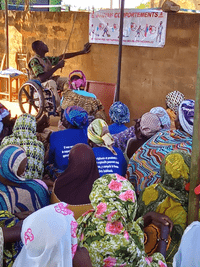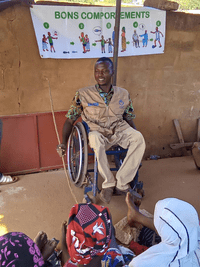Educating people about risks is a means of giving them hope
In Burkina Faso, communities are exposed to the threat of explosive ordnance every day. HI's teams are providing risk education in a very tense security context.

A risk awareness session delivered by HI. | © HI
In Burkina Faso, huge numbers of people face violence and exactions from armed groups. Many have been forced to flee their homes to find safety. To help relieve their distress and uncertainty, HI teams are working with communities to inform them about and protect them from the dangers of explosive ordnance.
A worsening context
 The security situation in Burkina Faso, because of raids and exactions by armed groups, has rendered some areas difficult to access. The situation is at its worst in the Sahel region where the conflicts are the most intense, but there are major difficulties everywhere, including in the East.
The security situation in Burkina Faso, because of raids and exactions by armed groups, has rendered some areas difficult to access. The situation is at its worst in the Sahel region where the conflicts are the most intense, but there are major difficulties everywhere, including in the East.
Security issues have prevented HI teams from accessing many areas. In recent years, measures taken by HI have helped to reduce the areas in need of interventions. HI teams have sometimes had to suspend their activity because armed groups were on their doorstep.
"It's important to understand that, in addition to the access issues, we are dealing with a touchy subject. We operate in the communities from which these armed groups originate. We have no way of knowing who these groups are, so we have to analyse the situation and choose our words really carefully and according to the context. The messages we deliver are sensitive; it would only take a slight misinterpretation or misunderstanding for them to be taken badly," explains Abdoul Ouédraogo, project manager for risk education in the East zone.
To overcome some of these difficulties, HI’s teams broadcast awareness-raising messages on local radio stations as a way of reaching physically inaccessible areas. These messages are broadcast in the main languages spoken in these areas, so that everyone can understand them: French, Fulfulde, Mooré and Gulmancéma in the East, and French, Mooré, Tamacheq and Fulfulde in the Sahel.
Key protection messages
 In the communities, HI's teams focus on prevention to reduce the number of accidents caused by explosive ordnance. Communities are first taught how to spot an explosive device, and then how to behave when they find themselves in a risky situation. There are right and wrong behaviours, so it's important to know what and what not to do. HI also teaches communities how to identify hazardous areas and raises awareness of the psychological, physical and economic impact of explosive devices.
In the communities, HI's teams focus on prevention to reduce the number of accidents caused by explosive ordnance. Communities are first taught how to spot an explosive device, and then how to behave when they find themselves in a risky situation. There are right and wrong behaviours, so it's important to know what and what not to do. HI also teaches communities how to identify hazardous areas and raises awareness of the psychological, physical and economic impact of explosive devices.
"When we talk about risk reduction, we must never forget that we're talking to people who have already been through terrible experiences. The session can remind them of painful events from their past, and we have to proceed with caution," Abdoul tells us.
HI’s teams also organise one-day training sessions for community leaders, who help to convey the messages to their community. The same goes for teachers, who pass the information on to their students. The teams also distribute flyers, bags, mugs and other items with key awareness messages printed on them.
Raising awareness of risks is useful work
"Risk education is a very satisfying activity. Its impact can be measured in the long term, but also immediately. When community leaders or teachers agree to speak during the sessions, we already feel that we're doing something useful. Despite their sensitive nature, the messages are very well received by the community. We're doing mental mine clearance, in fact, because we're preparing the ground for people to return home," says Abdoul.
Between April 2022 and August 2023, HI teams informed more than 21,300 people in the East and Sahel regions about the risks associated with explosive ordnance.
"By passing on risk education messages, we are also sending a message of hope to the communities: one day they will be able to return home. And when that day comes, they will know the dangers and how to behave. We're already looking to the future," concludes Abdoul.
This risk education project in Burkina Faso is funded by the German Federal Foreign Office (GFFO). It was launched in June 2021 and by the end of November 2023, more than 28,500 people had been informed about explosive ordnance risks in Burkina Faso.





